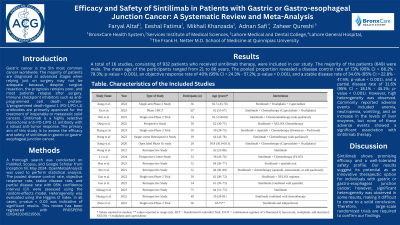Tuesday Poster Session
Category: Stomach
P5057 - Efficacy and Safety of Sintilimab in Patients With Gastric or Gastroesophageal Junction Cancer: A Systematic Review and Meta-Analysis
Tuesday, October 29, 2024
10:30 AM - 4:00 PM ET
Location: Exhibit Hall E

Has Audio

Zaheer Qureshi, MD
The Frank H. Netter M.D. School of Medicine at Quinnipiac University
Bronx, NY
Presenting Author(s)
Faryal Altaf, MD1, Eeshal Fatima, MBBS2, Mikail Khanzada, MBBS3, Adnan Safi, MBBS4, Zaheer Qureshi, MD5
1BronxCare Health System, Bronx, NY; 2Services Institute of Medical Sciences, Lahore, Punjab, Pakistan; 3Lahore Medical and Dental College, Lahore, Punjab, Pakistan; 4Lahore General Hospital, Lahore, Punjab, Pakistan; 5The Frank H. Netter M.D. School of Medicine at Quinnipiac University, Bronx, NY
Introduction: Gastric cancer is the 5th most common cancer worldwide. The majority of patients are diagnosed at advanced stages when relying just on surgery may not be adequate because, despite surgical resection, the prognosis remains poor, and most patients relapse after surgery. Immune checkpoint inhibitors such as anti-programmed cell death protein-1/programmed death-ligand 1 (PD-1/PD-L1) antibodies are primarily approved for the treatment of inoperable or metastatic solid cancers. Sintilimab is a highly selective monoclonal anti-PD-1/PD-L1 antibody with a robust anti-tumor response. The primary aim of this study is to assess the efficacy and safety of sintilimab in gastric or gastro-esophageal junction cancer.
Methods: A thorough search was conducted on PubMed, Scopus, and Google Scholar from inception till May 2024. OpenMeta[Analyst] was used to perform statistical analysis. The pooled disease control rate, objective response rate, stable disease rate, and partial disease rate with 95% confidence interval (CI) were assessed using the random-effects model. Heterogeneity was evaluated using the Higgins I2 index. In all cases, p-value < 0.05 was indicative of significant results. This review has been registered with PROSPERO (CRD42024521560).
Results: A total of 16 studies, consisting of 932 patients who received sintilimab therapy, were included in our study. The majority of the patients (649) were male. The mean age of the participants ranged from 21 to 86 years. The pooled proportion revealed a disease control rate of 73% (95% CI = 66.2% - 79.3%; p-value < 0.001), an objective response rate of 40% (95% CI = 24.3% - 57.2%; p-value < 0.001), and a stable disease rate of 34.6% (95% CI = 22.8% - 47.4%; p-value < 0.001), and a partial disease rate of 31.6% (95% CI = 18.1% - 45.1%; p-value < 0.001). However, high heterogeneity was observed. Commonly reported adverse events included anemia, neutropenia, vomiting, and an increase in the levels of liver enzymes, but none of these adverse events showed a significant association with sintilimab therapy.
Discussion: Sintilimab shows promising efficacy and a well-tolerated safety profile. Our results suggest its potential as an innovative therapeutic option for individuals with gastric or gastro-esophageal junction cancer; however, significant heterogeneity was observed in some results, making it difficult to come to a solid conclusion. Therefore, large-scale randomized trials are required to confirm our findings.
Note: The table for this abstract can be viewed in the ePoster Gallery section of the ACG 2024 ePoster Site or in The American Journal of Gastroenterology's abstract supplement issue, both of which will be available starting October 27, 2024.
Disclosures:
Faryal Altaf, MD1, Eeshal Fatima, MBBS2, Mikail Khanzada, MBBS3, Adnan Safi, MBBS4, Zaheer Qureshi, MD5. P5057 - Efficacy and Safety of Sintilimab in Patients With Gastric or Gastroesophageal Junction Cancer: A Systematic Review and Meta-Analysis, ACG 2024 Annual Scientific Meeting Abstracts. Philadelphia, PA: American College of Gastroenterology.
1BronxCare Health System, Bronx, NY; 2Services Institute of Medical Sciences, Lahore, Punjab, Pakistan; 3Lahore Medical and Dental College, Lahore, Punjab, Pakistan; 4Lahore General Hospital, Lahore, Punjab, Pakistan; 5The Frank H. Netter M.D. School of Medicine at Quinnipiac University, Bronx, NY
Introduction: Gastric cancer is the 5th most common cancer worldwide. The majority of patients are diagnosed at advanced stages when relying just on surgery may not be adequate because, despite surgical resection, the prognosis remains poor, and most patients relapse after surgery. Immune checkpoint inhibitors such as anti-programmed cell death protein-1/programmed death-ligand 1 (PD-1/PD-L1) antibodies are primarily approved for the treatment of inoperable or metastatic solid cancers. Sintilimab is a highly selective monoclonal anti-PD-1/PD-L1 antibody with a robust anti-tumor response. The primary aim of this study is to assess the efficacy and safety of sintilimab in gastric or gastro-esophageal junction cancer.
Methods: A thorough search was conducted on PubMed, Scopus, and Google Scholar from inception till May 2024. OpenMeta[Analyst] was used to perform statistical analysis. The pooled disease control rate, objective response rate, stable disease rate, and partial disease rate with 95% confidence interval (CI) were assessed using the random-effects model. Heterogeneity was evaluated using the Higgins I2 index. In all cases, p-value < 0.05 was indicative of significant results. This review has been registered with PROSPERO (CRD42024521560).
Results: A total of 16 studies, consisting of 932 patients who received sintilimab therapy, were included in our study. The majority of the patients (649) were male. The mean age of the participants ranged from 21 to 86 years. The pooled proportion revealed a disease control rate of 73% (95% CI = 66.2% - 79.3%; p-value < 0.001), an objective response rate of 40% (95% CI = 24.3% - 57.2%; p-value < 0.001), and a stable disease rate of 34.6% (95% CI = 22.8% - 47.4%; p-value < 0.001), and a partial disease rate of 31.6% (95% CI = 18.1% - 45.1%; p-value < 0.001). However, high heterogeneity was observed. Commonly reported adverse events included anemia, neutropenia, vomiting, and an increase in the levels of liver enzymes, but none of these adverse events showed a significant association with sintilimab therapy.
Discussion: Sintilimab shows promising efficacy and a well-tolerated safety profile. Our results suggest its potential as an innovative therapeutic option for individuals with gastric or gastro-esophageal junction cancer; however, significant heterogeneity was observed in some results, making it difficult to come to a solid conclusion. Therefore, large-scale randomized trials are required to confirm our findings.
Note: The table for this abstract can be viewed in the ePoster Gallery section of the ACG 2024 ePoster Site or in The American Journal of Gastroenterology's abstract supplement issue, both of which will be available starting October 27, 2024.
Disclosures:
Faryal Altaf indicated no relevant financial relationships.
Eeshal Fatima indicated no relevant financial relationships.
Mikail Khanzada indicated no relevant financial relationships.
Adnan Safi indicated no relevant financial relationships.
Zaheer Qureshi indicated no relevant financial relationships.
Faryal Altaf, MD1, Eeshal Fatima, MBBS2, Mikail Khanzada, MBBS3, Adnan Safi, MBBS4, Zaheer Qureshi, MD5. P5057 - Efficacy and Safety of Sintilimab in Patients With Gastric or Gastroesophageal Junction Cancer: A Systematic Review and Meta-Analysis, ACG 2024 Annual Scientific Meeting Abstracts. Philadelphia, PA: American College of Gastroenterology.
